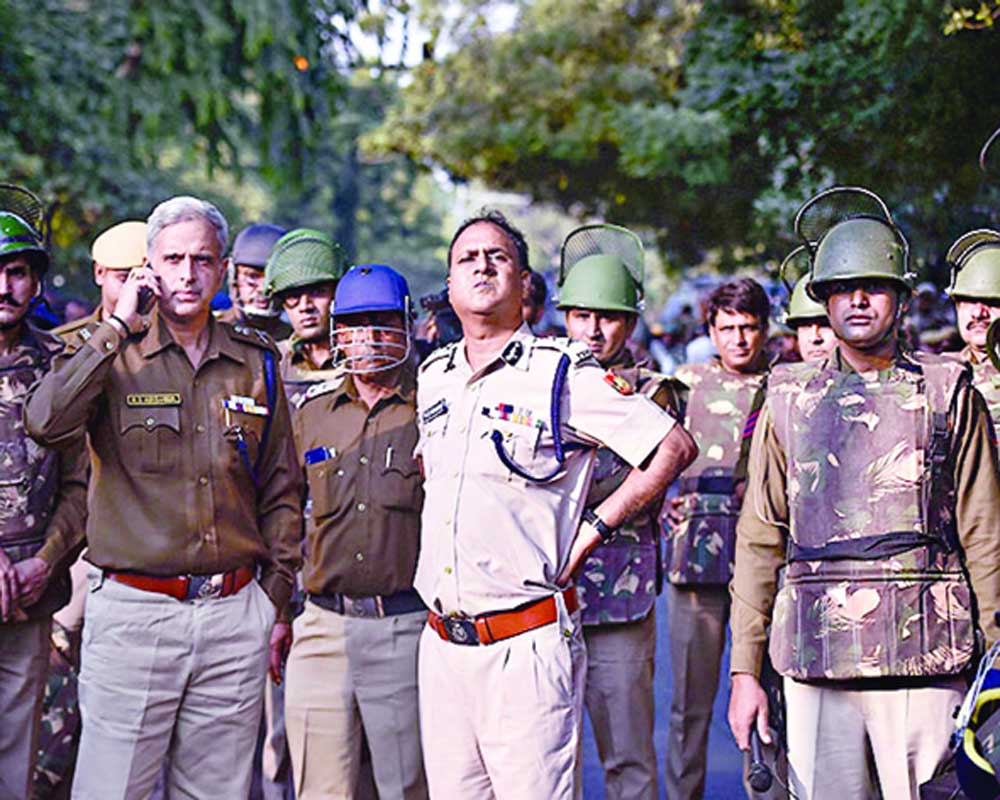EC raps Delhi cop for controversial remarks on shooter as the force stands trapped between its image and Govt mandate
The Delhi Police is indeed in a Catch-22 situation. At one end, it has to listen to its political masters and demonstrably act in a manner that suits their political narrative, as is its wont. On the other, its pliancy in handling protests and dissent — sometimes as an unsparing oppressor and sometimes as a silent observer — is costing its image. And that had been built over long years of professionalism, one that made it a force to be emulated and trusted. Today, in a polarised society, where there are daily encounters between an aggressive establishment and an unrelenting dissent, its credibility has been the worst casualty. So it comes as no surprise that the Election Commission has been issuing demarches against it. On Sunday, the poll panel removed the deputy commissioner of police, South-East Delhi, Chinmoy Biswal, after two firing incidents were reported from Shaheen Bagh and Jamia Millia Islamia University amid protests against the Citizenship Amendment Act (CAA). This was for allowing the situation to drift out of hand. Now it has ordered the Delhi Police not to assign officer Rajesh Deo any poll-related duty for making controversial statements that the shooter of Shaheen Bagh was a member of the Aam Aadmi Party (AAP), a claim confidently run down by the boy’s family, who said that he had sympathies for the BJP instead. Clearly, here the police found itself in a pickle for jumping the gun and, through selective briefings, appeared to take sides in a routine propaganda war. Sometimes, the forces themselves have not been too happy with the way they have been used as executors and even punished for doing their job. One is reminded of the thousands of personnel who held an unprecedented 11-hour protest at the gates of the police headquarters, demanding action against lawyers who allegedly attacked their colleagues at the Tis Hazari Court some time ago. The problem is that successive regimes have tried to mould the police to translate their authority on the ground and ensure mass subservience through fear. Still, there was some remnant of character in the institution’s leadership. Now even that is not allowed or cut to size. The politicisation of the police is not new or peculiar to Delhi. The State police forces have been known to change colour with every regime change. In this respect, the UP police has acquired the distinction of being more loyal than the king over the years, a behavioural discipline that explains its current bias towards a particular faith and arresting its practitioners during the anti-CAA agitation. And if the political establishment gives an open-ended licence with vengeful rhetoric, then the consequent police action is but a corollary of this endorsement. Within the first one-and-a-half years of assuming power, the Yogi Adityanath Government had earned the dubious distinction of recording 67 deaths in 1,500 police encounters. The UP police, one of the most decorated and prized in the immediate years after Independence, is a classic case of how politics can ruin abilities and rectitude. Emergency did greater harm to the institution countrywide. Through regimes, a caste and communal orientation was also given to an institution born of a colonial legacy that taught compliance. This has completely lowered the status of the police.
Does that mean that the police forces are so compromised that they cannot ensure tenets of justice or do what they are mandated to do by the Constitution, namely maintain law and order and look after public interests? The job of the police is to prevent subversion of civic life, not abet conditions that challenge it. Policemen are trained to handle crowds, not mishandle the situation, ensure minimal use of force but maximum enforcement of discipline. Even when crowd behaviour goes out of hand, no authority or political master can hold personnel to account for containing an explosive situation, for they are empowered to prevent anarchy of any sort. Why do we need the police if not to stand apart with its split second judgment and sensitivity, one that knows how to deal with an angry people and grade responses as situations evolve? The job of the police is to restore normalcy. Neither should it try to colour its actions with political logic, as some remarks made by policemen during protests have shown, nor should it be seen as using force to teach protesters a lesson. That restraint and assessment make a force stand apart no matter who is in Government. Perhaps, we need to relearn lessons for enforcement of law and order.


























